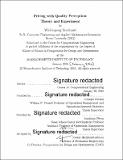Pricing with quality perception : theory and experiment
Author(s)
Sinchaisri, Wichinpong (Wichinpong Park)
DownloadFull printable version (9.002Mb)
Other Contributors
Massachusetts Institute of Technology. Computation for Design and Optimization Program.
Advisor
Georgia Perakis and Yanchong Zheng.
Terms of use
Metadata
Show full item recordAbstract
Quality is one of the most important factors behind a decision to purchase any product. Consumers have long assumed that price and quality are highly correlated, and that as the price of a product increases, its quality also increases ("you get what you pay for"). Several researchers have studied how consumers use price to infer quality, but very few have investigated the impact of pricing strategies, particularly price markdowns, on quality perception and how a retailer should react to such behavior. Our key research questions, viewed through both an empirical and a theoretical lens, concern how markdowns with different discount levels may induce different consumer behaviors and how the firm should incorporate them when optimizing its markdown policy. We empirically elicit the relationship between a consumer's quality perception and available price information, and refine a consumer demand model to capture these insights, together with other motives-reference dependence, loss aversion, patience, and optimism. For the retailer, we characterize the structure of the market segmentation and analyze its optimal markdown strategy when consumers are sensitive to quality. We present conditions in which it is optimal for the firm to apply a markdown to its products. When consumers are more sensitive to the product's original price than to the discount, or are impatient to wait for the future discounts, the retailer can earn the maximum revenue when applying a markdown strategy. Furthermore, we advocate that the firm should pre-announce the information about future markdowns in order to avoid the negative effect of the consumers' inaccurate estimates.
Description
Thesis: S.M., Massachusetts Institute of Technology, Computation for Design and Optimization Program, 2016. Cataloged from PDF version of thesis. Includes bibliographical references (pages 111-115).
Date issued
2016Department
Massachusetts Institute of Technology. Computation for Design and Optimization ProgramPublisher
Massachusetts Institute of Technology
Keywords
Computation for Design and Optimization Program.